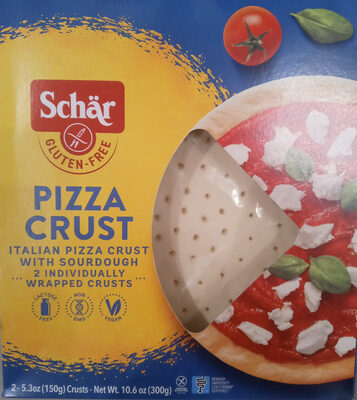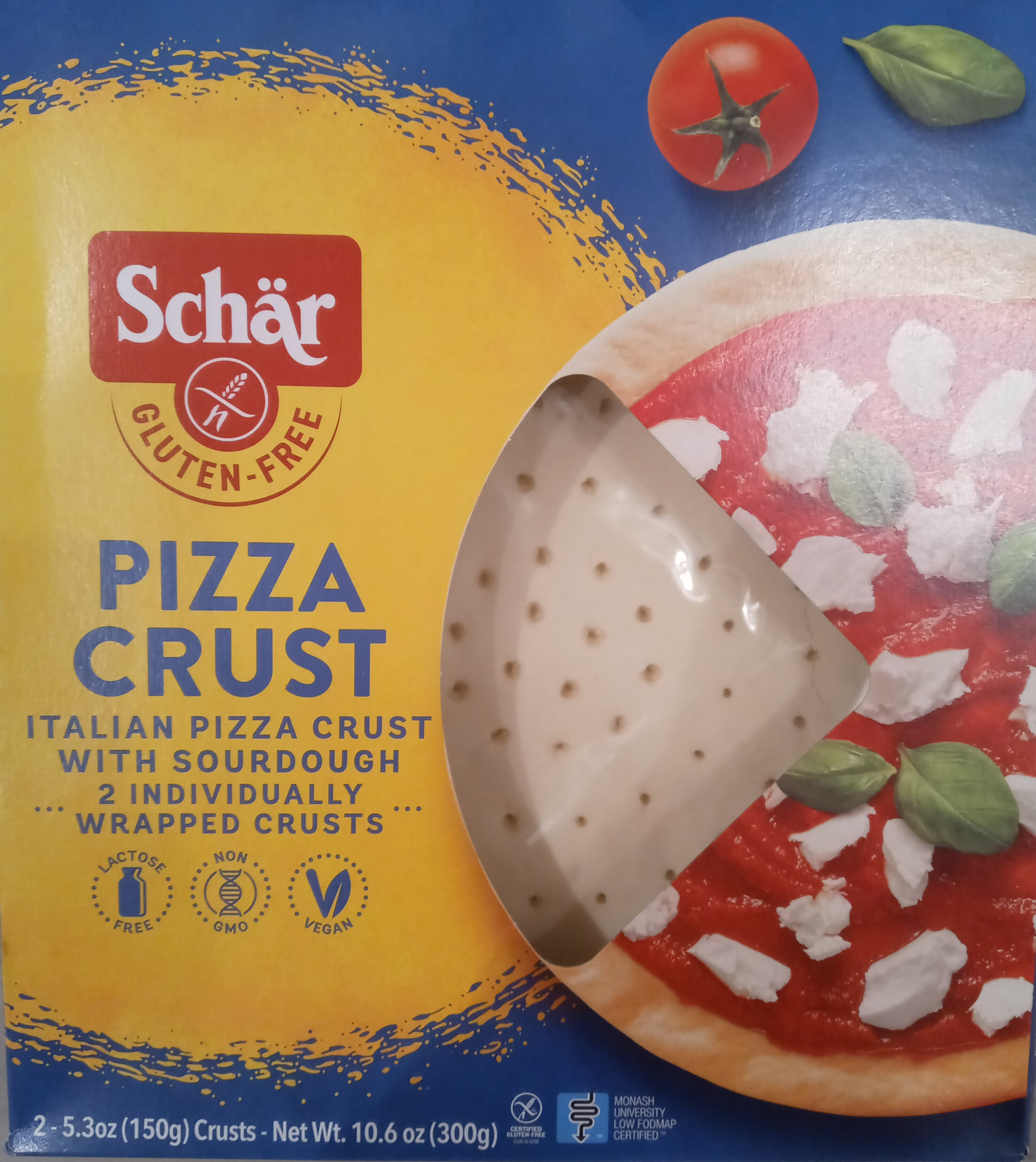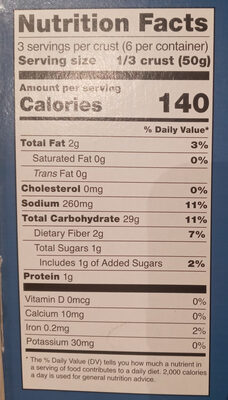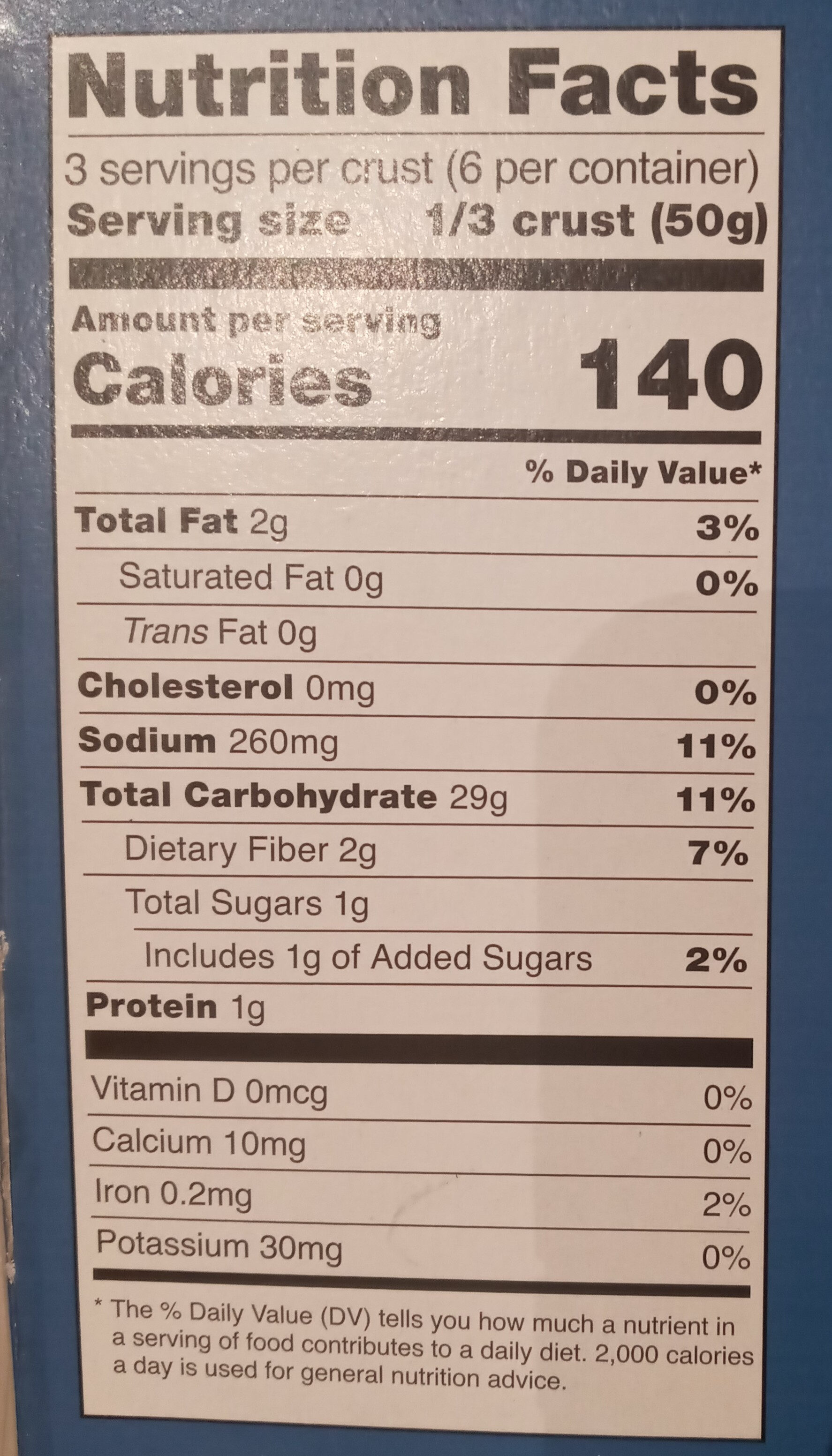Help us make food transparency the norm!
As a non-profit organization, we depend on your donations to continue informing consumers around the world about what they eat.
The food revolution starts with you!
Gluten free italian pizza crusts - Schar
Gluten free italian pizza crusts - Schar
This product page is not complete. You can help to complete it by editing it and adding more data from the photos we have, or by taking more photos using the app for Android or iPhone/iPad. Thank you!
×
Barcode: 0810757010081 (EAN / EAN-13) 810757010081 (UPC / UPC-A)
Brands: Schar
Brand owner: SCHAR
Categories: Plant-based foods and beverages, Plant-based foods, Cereals and potatoes, Cereals and their products, Pie dough
Labels, certifications, awards: No gluten, Vegetarian, Vegan
Countries where sold: United States
Matching with your preferences
Health
Ingredients
-
23 ingredients
corn starch, rice flour, water, sourdough (rice flour, water), potato starch, rice starch, corn flour, corn syrup, yeast, modified cellulose, dextrose, extra virgin olive oil, sunflower oil, psyllium seed husk (vegetable fiber), iodized salt, soy protein, glucono delta-lactone, baking soda, tartaric acid, citric acidAllergens: Soybeans
Food processing
-
Ultra processed foods
Elements that indicate the product is in the 4 - Ultra processed food and drink products group:
- Additive: E460 - Cellulose
- Ingredient: Dextrose
- Ingredient: Glucose
Food products are classified into 4 groups according to their degree of processing:
- Unprocessed or minimally processed foods
- Processed culinary ingredients
- Processed foods
- Ultra processed foods
The determination of the group is based on the category of the product and on the ingredients it contains.
Additives
-
E330 - Citric acid
Citric acid is a natural organic acid found in citrus fruits such as lemons, oranges, and limes.
It is widely used in the food industry as a flavor enhancer, acidulant, and preservative due to its tart and refreshing taste.
Citric acid is safe for consumption when used in moderation and is considered a generally recognized as safe (GRAS) food additive by regulatory agencies worldwide.
-
E334 - L(+)-tartaric acid
Tartaric acid: Tartaric acid is a white, crystalline organic acid that occurs naturally in many fruits, most notably in grapes, but also in bananas, tamarinds, and citrus. Its salt, potassium bitartrate, commonly known as cream of tartar, develops naturally in the process of winemaking. It is commonly mixed with sodium bicarbonate and is sold as baking powder used as a leavening agent in food preparation. The acid itself is added to foods as an antioxidant and to impart its distinctive sour taste. Tartaric is an alpha-hydroxy-carboxylic acid, is diprotic and aldaric in acid characteristics, and is a dihydroxyl derivative of succinic acid.Source: Wikipedia
-
E460 - Cellulose
Cellulose: Cellulose is an organic compound with the formula -C6H10O5-n, a polysaccharide consisting of a linear chain of several hundred to many thousands of β-1→4- linked D-glucose units. Cellulose is an important structural component of the primary cell wall of green plants, many forms of algae and the oomycetes. Some species of bacteria secrete it to form biofilms. Cellulose is the most abundant organic polymer on Earth. The cellulose content of cotton fiber is 90%, that of wood is 40–50%, and that of dried hemp is approximately 57%.Cellulose is mainly used to produce paperboard and paper. Smaller quantities are converted into a wide variety of derivative products such as cellophane and rayon. Conversion of cellulose from energy crops into biofuels such as cellulosic ethanol is under development as a renewable fuel source. Cellulose for industrial use is mainly obtained from wood pulp and cotton.Some animals, particularly ruminants and termites, can digest cellulose with the help of symbiotic micro-organisms that live in their guts, such as Trichonympha. In human nutrition, cellulose is a non-digestible constituent of insoluble dietary fiber, acting as a hydrophilic bulking agent for feces and potentially aiding in defecation.Source: Wikipedia
-
E500 - Sodium carbonates
Sodium carbonates (E500) are compounds commonly used in food preparation as leavening agents, helping baked goods rise by releasing carbon dioxide when they interact with acids.
Often found in baking soda, they regulate the pH of food, preventing it from becoming too acidic or too alkaline. In the culinary world, sodium carbonates can also enhance the texture and structure of foods, such as noodles, by modifying the gluten network.
Generally recognized as safe, sodium carbonates are non-toxic when consumed in typical amounts found in food.
-
E500ii - Sodium hydrogen carbonate
Sodium hydrogen carbonate, also known as E500ii, is a food additive commonly used as a leavening agent.
When added to recipes, it releases carbon dioxide gas upon exposure to heat or acids, causing dough to rise and resulting in a light, fluffy texture in baked goods.
It is generally recognized as safe (GRAS) by regulatory authorities when used in appropriate quantities and poses no significant health risks when consumed in typical food applications.
-
E575 - Glucono-delta-lactone
Glucono delta-lactone: Glucono delta-lactone -GDL-, also known as gluconolactone, is a food additive with the E number E575 used as a sequestrant, an acidifier, or a curing, pickling, or leavening agent. It is a lactone of D-gluconic acid. Pure GDL is a white odorless crystalline powder. GDL has been marketed for use in feta cheese. GDL is neutral, but hydrolyses in water to gluconic acid which is acidic, adding a tangy taste to foods, though it has roughly a third of the sourness of citric acid. It is metabolized to 6-phospho-D-gluconate; one gram of GDL yields roughly the same amount of metabolic energy as one gram of sugar. Upon addition to water, GDL is partially hydrolysed to gluconic acid, with the balance between the lactone form and the acid form established as a chemical equilibrium. The rate of hydrolysis of GDL is increased by heat and high pH.The yeast Saccharomyces bulderi can be used to ferment gluconolactone to ethanol and carbon dioxide. The pH value greatly affects culture growth. Gluconolactone at 1 or 2% in a mineral media solution causes the pH to drop below 3.It is also a complete inhibitor of the enzyme amygdalin beta-glucosidase at concentrations of 1 mM.Source: Wikipedia
Ingredients analysis
-
Palm oil free
No ingredients containing palm oil detected
Unrecognized ingredients: Modified-celluloseSome ingredients could not be recognized.
We need your help!
You can help us recognize more ingredients and better analyze the list of ingredients for this product and others:
- Edit this product page to correct spelling mistakes in the ingredients list, and/or to remove ingredients in other languages and sentences that are not related to the ingredients.
- Add new entries, synonyms or translations to our multilingual lists of ingredients, ingredient processing methods, and labels.
If you would like to help, join the #ingredients channel on our Slack discussion space and/or learn about ingredients analysis on our wiki. Thank you!
-
Vegan
No non-vegan ingredients
Unrecognized ingredients: Sourdough, Modified-celluloseSome ingredients could not be recognized.
We need your help!
You can help us recognize more ingredients and better analyze the list of ingredients for this product and others:
- Edit this product page to correct spelling mistakes in the ingredients list, and/or to remove ingredients in other languages and sentences that are not related to the ingredients.
- Add new entries, synonyms or translations to our multilingual lists of ingredients, ingredient processing methods, and labels.
If you would like to help, join the #ingredients channel on our Slack discussion space and/or learn about ingredients analysis on our wiki. Thank you!
-
Vegetarian
No non-vegetarian ingredients detected
Unrecognized ingredients: Sourdough, Modified-celluloseSome ingredients could not be recognized.
We need your help!
You can help us recognize more ingredients and better analyze the list of ingredients for this product and others:
- Edit this product page to correct spelling mistakes in the ingredients list, and/or to remove ingredients in other languages and sentences that are not related to the ingredients.
- Add new entries, synonyms or translations to our multilingual lists of ingredients, ingredient processing methods, and labels.
If you would like to help, join the #ingredients channel on our Slack discussion space and/or learn about ingredients analysis on our wiki. Thank you!
-
Details of the analysis of the ingredients
We need your help!
Some ingredients could not be recognized.
We need your help!
You can help us recognize more ingredients and better analyze the list of ingredients for this product and others:
- Edit this product page to correct spelling mistakes in the ingredients list, and/or to remove ingredients in other languages and sentences that are not related to the ingredients.
- Add new entries, synonyms or translations to our multilingual lists of ingredients, ingredient processing methods, and labels.
If you would like to help, join the #ingredients channel on our Slack discussion space and/or learn about ingredients analysis on our wiki. Thank you!
: corn starch, rice flour, water, sourdough (rice flour, water), potato starch, rice starch, corn flour, corn syrup, yeast, modified cellulose, dextrose, extra virgin olive oil, sunflower oil, psyllium seed husk (vegetable fiber), iodized salt, soy protein, glucono delta-lactone, baking soda, tartaric acid, citric acid- corn starch -> en:corn-starch - vegan: yes - vegetarian: yes - ciqual_food_code: 9510 - percent_min: 5 - percent_max: 100
- rice flour -> en:rice-flour - vegan: yes - vegetarian: yes - ciqual_food_code: 9520 - percent_min: 0 - percent_max: 50
- water -> en:water - vegan: yes - vegetarian: yes - ciqual_food_code: 18066 - percent_min: 0 - percent_max: 33.3333333333333
- sourdough -> en:sourdough - percent_min: 0 - percent_max: 25
- rice flour -> en:rice-flour - vegan: yes - vegetarian: yes - ciqual_food_code: 9520 - percent_min: 0 - percent_max: 25
- water -> en:water - vegan: yes - vegetarian: yes - ciqual_food_code: 18066 - percent_min: 0 - percent_max: 12.5
- potato starch -> en:potato-starch - vegan: yes - vegetarian: yes - ciqual_proxy_food_code: 9510 - percent_min: 0 - percent_max: 20
- rice starch -> en:rice-starch - vegan: yes - vegetarian: yes - ciqual_proxy_food_code: 9510 - percent_min: 0 - percent_max: 16.6666666666667
- corn flour -> en:corn-flour - vegan: yes - vegetarian: yes - ciqual_food_code: 9545 - percent_min: 0 - percent_max: 14.2857142857143
- corn syrup -> en:corn-syrup - vegan: yes - vegetarian: yes - ciqual_proxy_food_code: 31089 - percent_min: 0 - percent_max: 12.5
- yeast -> en:yeast - vegan: yes - vegetarian: yes - percent_min: 0 - percent_max: 11.1111111111111
- modified cellulose -> en:modified-cellulose - percent_min: 0 - percent_max: 10
- dextrose -> en:dextrose - vegan: yes - vegetarian: yes - ciqual_proxy_food_code: 31016 - percent_min: 0 - percent_max: 9.09090909090909
- extra virgin olive oil -> en:extra-virgin-olive-oil - vegan: yes - vegetarian: yes - from_palm_oil: no - ciqual_food_code: 17270 - percent_min: 0 - percent_max: 8.33333333333333
- sunflower oil -> en:sunflower-oil - vegan: yes - vegetarian: yes - from_palm_oil: no - ciqual_food_code: 17440 - percent_min: 0 - percent_max: 7.69230769230769
- psyllium seed husk -> en:psyllium - vegan: yes - vegetarian: yes - percent_min: 0 - percent_max: 7.14285714285714
- vegetable fiber -> en:vegetable-fiber - vegan: yes - vegetarian: yes - percent_min: 0 - percent_max: 7.14285714285714
- iodized salt -> en:iodised-salt - vegan: yes - vegetarian: yes - ciqual_food_code: 11058 - percent_min: 0 - percent_max: 1.3
- soy protein -> en:soy-protein - vegan: yes - vegetarian: yes - ciqual_food_code: 20591 - percent_min: 0 - percent_max: 1.3
- glucono delta-lactone -> en:e575 - vegan: yes - vegetarian: yes - percent_min: 0 - percent_max: 1.3
- baking soda -> en:e500ii - vegan: yes - vegetarian: yes - percent_min: 0 - percent_max: 1.3
- tartaric acid -> en:e334 - vegan: yes - vegetarian: yes - percent_min: 0 - percent_max: 1.3
- citric acid -> en:e330 - vegan: yes - vegetarian: yes - percent_min: 0 - percent_max: 1.3
Nutrition
-
Good nutritional quality
⚠ ️Warning: the amount of fruits, vegetables and nuts is not specified on the label, it was estimated from the list of ingredients: 0This product is not considered a beverage for the calculation of the Nutri-Score.
Positive points: 6
- Proteins: 2 / 5 (value: 4, rounded value: 4)
- Fiber: 4 / 5 (value: 4, rounded value: 4)
- Fruits, vegetables, nuts, and colza/walnut/olive oils: 0 / 5 (value: 0.023193359375, rounded value: 0)
Negative points: 8
- Energy: 3 / 10 (value: 1255, rounded value: 1255)
- Sugars: 0 / 10 (value: 2, rounded value: 2)
- Saturated fat: 0 / 10 (value: 0, rounded value: 0)
- Sodium: 5 / 10 (value: 520, rounded value: 520)
The points for proteins are counted because the negative points are less than 11.
Nutritional score: (8 - 6)
Nutri-Score:
-
Nutrient levels
-
Fat in moderate quantity (4%)
What you need to know- A high consumption of fat, especially saturated fats, can raise cholesterol, which increases the risk of heart diseases.
Recommendation: Limit the consumption of fat and saturated fat- Choose products with lower fat and saturated fat content.
-
Saturated fat in low quantity (0%)
What you need to know- A high consumption of fat, especially saturated fats, can raise cholesterol, which increases the risk of heart diseases.
Recommendation: Limit the consumption of fat and saturated fat- Choose products with lower fat and saturated fat content.
-
Sugars in low quantity (2%)
What you need to know- A high consumption of sugar can cause weight gain and tooth decay. It also augments the risk of type 2 diabetes and cardio-vascular diseases.
Recommendation: Limit the consumption of sugar and sugary drinks- Sugary drinks (such as sodas, fruit beverages, and fruit juices and nectars) should be limited as much as possible (no more than 1 glass a day).
- Choose products with lower sugar content and reduce the consumption of products with added sugars.
-
Salt in moderate quantity (1.3%)
What you need to know- A high consumption of salt (or sodium) can cause raised blood pressure, which can increase the risk of heart disease and stroke.
- Many people who have high blood pressure do not know it, as there are often no symptoms.
- Most people consume too much salt (on average 9 to 12 grams per day), around twice the recommended maximum level of intake.
Recommendation: Limit the consumption of salt and salted food- Reduce the quantity of salt used when cooking, and don't salt again at the table.
- Limit the consumption of salty snacks and choose products with lower salt content.
-
-
Nutrition facts
Nutrition facts As sold
for 100 g / 100 mlAs sold
per serving (0.333 SLICE (50 g))Compared to: Pie dough Energy 1,255 kj
(300 kcal)628 kj
(150 kcal)-19% Fat 4 g 2 g -76% Saturated fat 0 g 0 g -100% Trans fat 0 g 0 g Cholesterol 0 mg 0 mg -100% Carbohydrates 64 g 32 g +35% Sugars 2 g 1 g -81% Fiber 4 g 2 g +174% Proteins 4 g 2 g -30% Salt 1.3 g 0.65 g +11% Vitamin A 0 µg 0 µg -100% Vitamin C (ascorbic acid) 2.4 mg 1.2 mg +11,168% Potassium 0 mg 0 mg -100% Calcium 0 mg 0 mg -100% Iron 5.4 mg 2.7 mg +165% Fruits‚ vegetables‚ nuts and rapeseed‚ walnut and olive oils (estimate from ingredients list analysis) 0.023 % 0.023 %
Environment
-
Eco-Score not computed - Unknown environmental impact
We could not compute the Eco-Score of this product as it is missing some data, could you help complete it?Could you add a precise product category so that we can compute the Eco-Score? Add a category
Packaging
-
Missing packaging information for this product
⚠ ️ The information about the packaging of this product is not filled in.Take a photo of the recycling information Take a photo of the recycling information
Transportation
-
Origins of ingredients
Missing origins of ingredients information
⚠ ️ The origins of the ingredients of this product are not indicated.
If they are indicated on the packaging, you can modify the product sheet and add them.
If you are the manufacturer of this product, you can send us the information with our free platform for producers.Add the origins of ingredients for this product Add the origins of ingredients for this product
Report a problem
-
Incomplete or incorrect information?
Category, labels, ingredients, allergens, nutritional information, photos etc.
If the information does not match the information on the packaging, please complete or correct it. Open Food Facts is a collaborative database, and every contribution is useful for all.
Data sources
Product added on by usda-ndb-import
Last edit of product page on by roboto-app.
Product page also edited by inf, openfoodfacts-contributors, org-database-usda.










